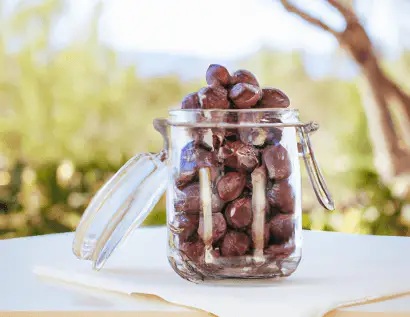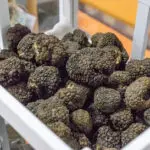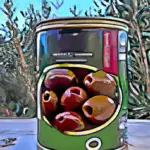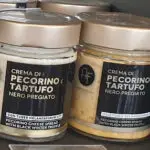When opening olive jars, many people expect—or at least hope—to hear a “pop!” when opening a vacuum-sealed jar. However, this isn’t always the case:

It’s perfectly normal for olive jars to not make any popping sound and it says nothing about the quality of its contents. Sometimes jars don’t make any sound at all upon cracking open, or they only give out a faint “sound”.
The vacuum seal is less tightly formed than when first sealed in the factory and doesn’t require as much force to break it – thus making no sound at all. So even if you don’t feel or hear your jar ‘breaking’, rest assured that you’ve successfully opened it and can now enjoy a tasty snack!
Should All Jars Pop When Opened?
The idea of jars popping when opened has become increasingly popular among food and beverage producers, in order to make sure that their product is free from any contaminants. It could also be seen as a safety measure for those opening the jars, especially if they’re filled with hot liquids or sauces, as the user will instantly know that the seal hasn’t been broken.
Although it is quite convenient and possibly beneficial, there are some drawbacks associated with having all jars pop upon opening. One major issue is that some food containers must not be popped when first opened but instead pried open slowly. This could potentially cause confusion among consumers and even lead to product waste if the contents were spoiled due to mishandling.
There’s also the possibility that lids may pop too soon and cause leakage during transit, leading to losses for producers.
In conclusion, while having all jars pop when opened offers certain conveniences and safety benefits, it might not always be optimal or possible depending on the type of jar or product inside.
Can Jars Seal Without Popping?
When it comes to canning, a popping lid is often seen as a sign of a successful seal. This not only ensures that your product can be stored for later but also keeps bacteria and mold from developing. However, jars that do not make that audible pop can still be safely sealed if done properly.
The thing to look for when determining whether your jar is safely sealed or not is the dome on the lid: you want to make sure it has been pulled down by the vacuum pressure created during processing.
If the dome appears tight and concave inwards, then you can rest assured that oxygen and microorganisms have been successfully kept out of your jar and that it has been securely sealed.
While not as reassuring as hearing the dome pop, looking for these subtle yet highly efficient indicators should provide assurance that your jars will store safely over time.
How Olives Are Packed and Vacuum Sealed
Olives are packed by hand, carefully removing any leaves or stem to ensure the quality of the final product. After that, they are washed and sorted into their respective sizes before being packaged. The olives are then distributed into cans, jars, or other containers depending on the size and grade of the olives.
For added shelf life and freshness, these containers are often vacuum sealed with a plastic lid. This method helps keep the olives crisp and flavorful while preventing air exposure that can lead to spoilage. Additionally, this prevents any bacteria or contamination from spreading throughout the container, ensuring maximum product safety for consumers.
Do All Olives Come in Jars?
No, not all olives come jarred. There are two types of olives, green and black; both can be found in jars, as well as in larger brine containers or bulk packs. Green olives are typically sold unripe and do require additional processing such as curing to make them edible.
These include common varieties like Manzanilla and Picholine. Black olives, on the other hand, are picked ripe off the tree and cured naturally without any extra processing. Some examples of black olives are Kalamata and Gaeta. Whether jarred or not, olives make a delicious addition to any dish and offer unique health benefits with very few calories!
How Do I Make Sure an Olive Jar Is Airtight?
To ensure that an olive jar is airtight, it’s incredibly important to start with a clean, dry surface. Gently rinse the jar in warm water prior to use and make sure it’s completely dry. Then fill the jar two-thirds of the way with olives, pour in enough extra-virgin olive oil or brine to cover them, and top off with extra-virgin olive oil if necessary.
To make sure that no air is getting into the jar, use a chopstick or other instrument to press down each olive so that all air bubbles are released before closing up the lid.
Make sure to properly close the lid as this will help create an airtight seal; you can verify this by pushing down on the center of the lid which should cause an indentation. Lastly, store your olive jar in a cool cupboard away from direct sunlight–this will help ensure they stay naturally preserved and last longer.
What Is the Best Way to Preserve Olives?
The best way to preserve olives is to use a saltwater brine as the solution for soaking them. Since olives are quite acidic, this technique helps lower the acidity and makes them intense in flavor.
Additionally, it allows long-term preservation of the fruit and adds an additional layer of safety against foodborne illnesses.
To make a brine, dissolve half a cup of sea salt into two quarts of tap water. Then add the olives and submerge them completely in the brine. Aromatics such as allspice, orange peel, cinnamon sticks, and bay leaves can also be added for added flavor.
The olives should soak for 3-4 weeks in the refrigerator before being consumed. Be sure to take out one olive every few days and taste test to ensure they have reached an optimal level of ripeness.
- The Top Restaurants Specializing in Truffle Dishes - August 10, 2023
- Truffle Panna Cotta: A Decadent Dessert Recipe for Truffle Lovers - August 7, 2023
- Truffle Scrambled Eggs: A Luxurious Breakfast Delight - August 7, 2023








